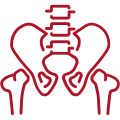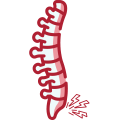Back Pain
Back Pain
Back Pain Treatment in Chennai

About back pain
Among the top causes of doctor visits and missed work is back pain. Most back pain episodes can be prevented or relieved by taking the right steps. It is often sufficient to treat your back at home using proper body mechanics and simple therapy if prevention fails. Back pain can often be treated without surgery.
Causes of Back Pain
Back pain can also result from some everyday activities or poor posture. Like
- Twisting
- coughing or sneezing
- muscle tension
- Over-stretching
- bending awkwardly or for long periods
- pushing, pulling, lifting, or carrying something
- standing or sitting for long periods
- straining the neck forward, such as when driving or using a computer
- long driving sessions without a break, even when not hunched
- sleeping on a mattress that does not support the body and keep the Spine straight
Some examples of mechanical causes of low back pain include:
- Congenital
- Injuries
- Degenerative problems
- Nerve and spinal cord problems
- Non-Spine Sources
How to Prevent Back Pain?
Prevention of Back Pain can be done by Addressing its Risk Factors Like-
- Exercise
- Regular Activities
- Right Diet
- Avoid Smoking
- Body weight
- Right Footwear
- Your Bed
- Sleep Sideways
- Reduce Stress
- Mind Your Postures
- Posture when standing
What are the Risk Factors of Developing Back Pain?
These factors might put you at greater risk of developing back Pain-
- Age
- Lack of exercise
- Medical Conditions
- Excess weight
- Fitness level
- Psychological conditions
- Smoking
- Your Work Style
- Pregnancy
- Genetic factors
- Backpack overload in children
Treatments Available to Treat Back Pain-
Self-management:
- Using Over-the-counter (OTC) pain relief medication, usually nonsteroidal anti-inflammatory drugs (NSAID), such as ibuprofen, can relieve discomfort.
- Applying a hot compress or an ice pack to Reduce the Pain
- Resuming normal activities as soon as possible may ease Pain; bed rest is not recommended for Prolonged Period.
- Exercises that strengthen the core or abdominal muscles may help to speed recovery from chronic low back pain. Always check first with a physician before starting an exercise program and to get a list of helpful exercises.
Medical treatment:
If Self Management treatments do not relieve back Pain, A Consultation with Your Healthcare Provider is Recommended. And He May Give You Medications to Treat Your Pain. Some Types of Medications are
- Over the Counter Drugs
- Topical rubs and ointments
- Neuropathic Pain Medications
- Muscle relaxants
- Antidepressants
- Opioids
Therapies to Treat Your Back:
- Physiotherapy
- Occupational therapy
- Physical therapy
Injections:
Sometimes injections are helpful for back pain or sciatica, which is more severe or if the usual treatments like physiotherapy painkillers aren’t working well enough.
- Cortisone injections: It is a Steroid Injection. Also known as a cortisone shot. If other options are not effective, these may be injected into the epidural space around the spinal cord.
- Botox: Botox (botulism toxin), according to Research, reduces Pain by paralyzing sprained muscles in spasm. These injections are effective for about 3 to 4 months.
Surgery:
Surgery for back pain is very rare. If Medications, Injections and Therapies don’t Work. If there are structural abnormalities seen, Surgery is Recommended, especially if there is persistent pain and nerve compression, which can lead to muscle weakness.
How is Back Pain diagnosed?
- A complete medical history includes a History of your back pain, including how often it happens and how severe it is, and a physical exam will be Done.
- During the physical exam, your provider will try to pinpoint the location of the Pain and figure out how it affects your movement.
- Depending on the History and Physical Conditions, Doctors May Prescribe Medications or advice for Tests
- Tests include:
- Blood tests
- Bone scans
- Discography
- Electrodiagnostics
- Diagnostic Imaging Tests Like X-Ray, MRI, CT Scans
Who Might Be On Your Back Pain Treatment Team?
When experiencing back pain, whether it’s acute, subacute, or chronic, you’ll be glad to know that several professionals can help you.
- Pain Specialist:
- Orthopaedic Surgeon:
- Neurosurgeon:
- Neurologist
- Physical Therapist
- Chiropractor
- Acupuncturist
FREQUENTLY ASKED QUESTIONS-
1) What Causes Back Pain?
Back pain commonly stems from strain, tension, or injury.
2) What should I do if my back pain is not improving?
Seek medical help if you experience any numbness or tingling, or if you have back Pain: that does not improve with rest after an injury or fall with numbness in the legs with weakness with fever with unexplained weight loss Diagnosis A doctor will usually be able to diagnose back pain after asking about symptoms and carrying out a physical examination.
3) What are the symptoms of back pain?
Stress, anxiety, and mood disorders have also been linked to Symptoms. The main symptom of back pain is an ache or pain anywhere in the Back, and sometimes all the way down to the buttocks and legs.
4) What are the risk factors for low back pain?
The following factors are linked to a higher risk of developing low back pain: pregnancy, a sedentary lifestyle, poor physical fitness, older age, obesity, smoking, strenuous physical exercise or work, especially if done incorrectly, genetic factors, medical conditions such as arthritis or/and Cancer. Lower back pain also tends to be more common in women than in men, possibly due to hormonal factors.
7) What is radicular Pain?
This type of pain can occur if a spinal nerve root becomes impinged or inflamed.
8) What are opioid medications?
Opioids are more potent pain medications that are prescribed for more severe Pain.
15) What tests will I need?
Tests May include Blood Tests, X-ray, CT scan of the lower Spine, MRI of the Lower Spine.
When should I talk to a doctor about my back pain?
You should make an appointment If you have back or neck pain that lasts for more than a few days and doesn’t subside with rest, heat and ice, or over-the-counter pain relievers. If you have any pain, numbness, or weakness in your legs or arms, you should seek medical treatment immediately.
How are back pain treated?
Synapse Pain and Spine Clinic creates customized treatment plans, usually combining medication with other therapies to relieve your pain and heal the condition causing it. Your treatment plan may include physical therapy, spinal injections, trigger point therapy or injections, and nerve blocks. In severe cases, your doctor may recommend surgery or an implantable device like a spinal cord stimulator to relieve your pain.
Back Pain Management Treatments Available
Find the best support for all Your Pain Concerns






